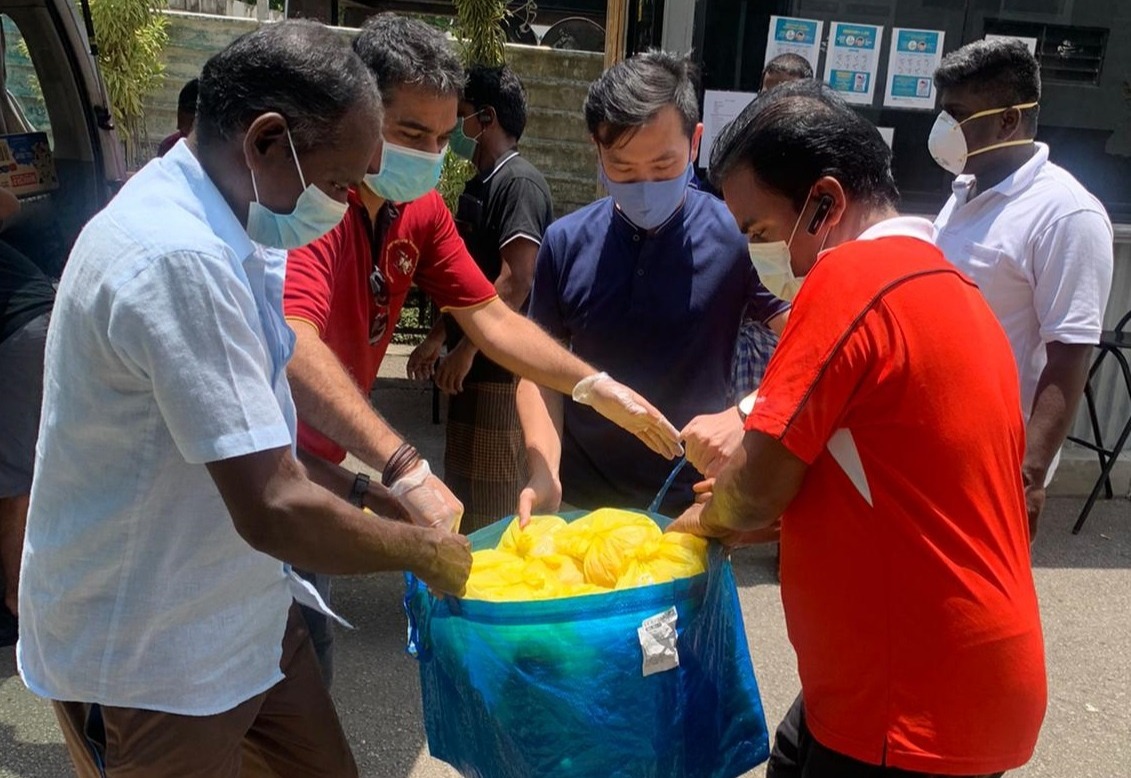Coronavirus: NGOs step in to help migrant workers at smaller housing facilities
Sign up now: Get ST's newsletters delivered to your inbox

Their priority is to address the basic needs of these migrant workers.
PHOTO: MIGRANT WORKERS' CENTRE/FACEBOOK
SINGAPORE - With an inter-agency task force moving quickly to address the needs of migrant workers in big dormitories, the challenge now is to look out for migrant workers in smaller housing facilities as they are scattered all over the island in groups of varying sizes.
There are more than 1,100 housing facilities like factory-converted dormitories that cater to workers, and a coalition of non-governmental organisations (NGO) and ground-up initiatives have taken on the task of assisting them, Mr Bernard Menon, executive director of Migrant Workers' Centre (MWC), told The Straits Times.
While the inter-agency task force on foreign worker dormitory management takes charge of the situation at purpose-built dormitories, NGOs and the ground-up initiatives have fanned out to help those living in smaller housing facilities, said Mr Menon.
Their priority is to address the basic needs of these migrant workers, such as catering food and providing sanitary products such as soap, shaving kits, laundry detergent and masks.
"Without being able to clean, shower... it would be very difficult for migrant workers to start to look at other things like safe distancing, watching their health," said Mr Menon, speaking to ST's assistant video editor Olivia Quay and multimedia correspondent Hairianto Diman on Friday (April 24) in ST's The Big Story.
His comments came as the foreign worker community here has been hit hard by the coronavirus pandemic. More than 2,600 migrant workers staying at large dormitories have been infected. There are about 200,000 migrant workers at large purpose-built dormitories.
But a growing worry is the increasing numbers of infected foreign workers who reside in other places like factory-converted dormitories or even shophouses.
The number of infected foreign workers who live outside dormitories had risen to 30 new cases on Thursday, a more than 50 per cent jump from last week's average of 19 new cases per day.
Smaller dormitories can house anywhere from 10 workers to more than 900, and are scattered all around the island, he added, noting that these logistical challenges compound the situation.
This is unlike the 43 purpose-built dormitories here, which are known to house between 3,000 and 25,000 residents each.
"The hope is that by helping dorm operators... fill and address such issues upfront, they would be better able to then help workers... by implementing safe distancing," said Mr Menon, adding that organisations also provide emotional and psychological counselling for workers.
The MWC has also continually engaged its group of migrant worker ambassadors, who help disseminate information to their compatriots on safe distancing and personal hygiene, he said.
They have helped the multi-agency task force in handling issues on the ground like food, essentials and mobile connectivity problems, he said.
"As we understand it, these issues have gradually stabilised in the last two weeks," he said, based on feedback from ambassadors on the ground.
Th MWC has continued to provide feedback to the task force on issues that crop up from time to time, he said, adding that the situation is being addressed systematically.
Mr Menon also noted that housing standards for migrant workers have evolved and improved over the years, to take into account issues like requiring more space for each worker, more recreational facilities and having facilities that are sanitary.
"Covid-19 is really very unprecedented in the way it spreads very very easily, very very quickly, and perhaps the way our dormitories were shaped" did not factor in the facing of a coronavirus, he said.
However, this does not mean the dormitories did not have their fair share of pandemic response measures, he said.
"Like in the case of Sars, when we come out of this... I'm sure there will be lessons, more changes and improvements made," he said.
"Most importantly, we need to focus on what's most urgent now: Taking care of migrant workers in the dormitories, regardless of what dormitory type they live in, and helping them as much as we can."


